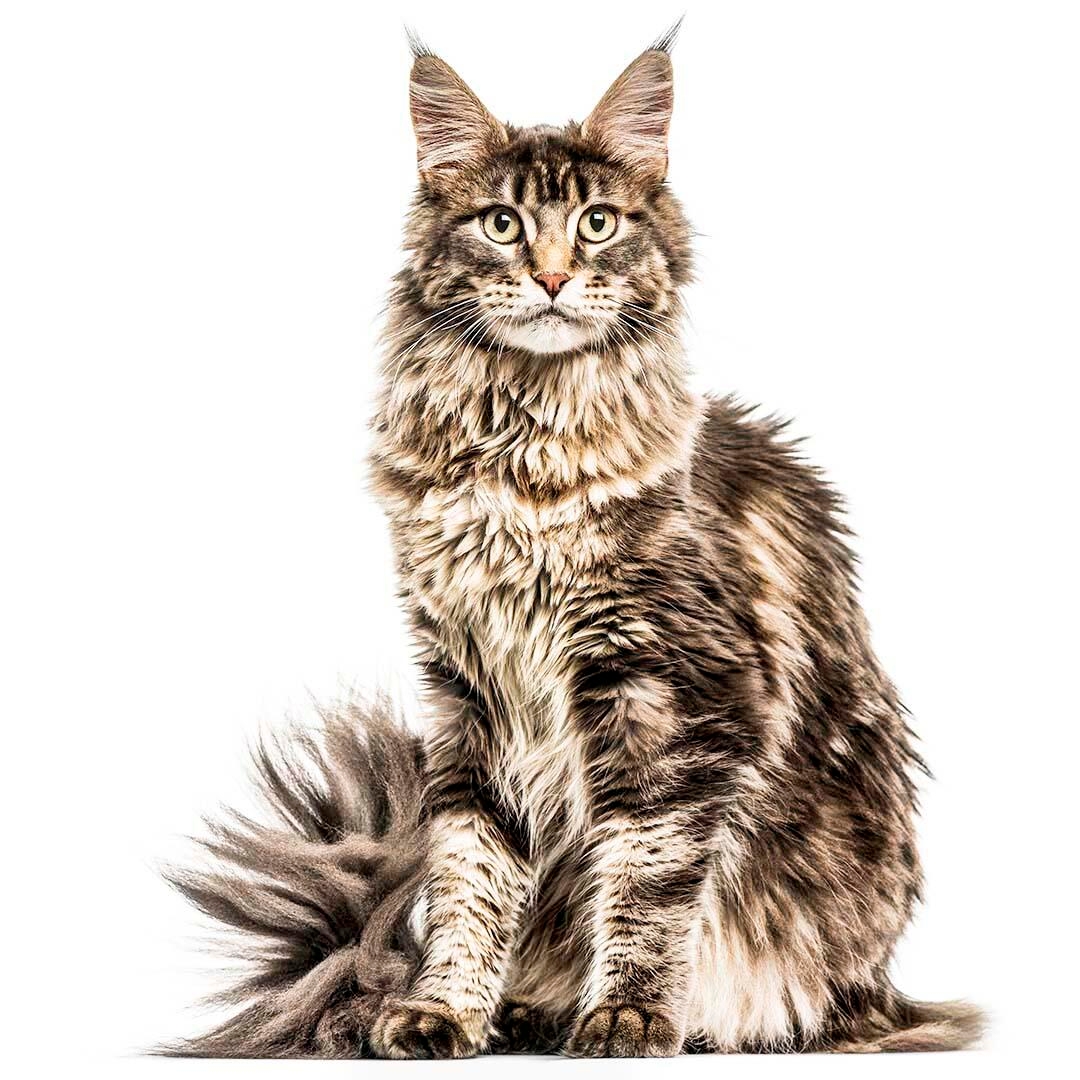
| Family-friendly: | 4/5 |
| Playfulness: | 4/5 |
| Intelligence: | 4/5 |
| Tendency to Vocalise: | 4/5 |
| Likes Other Pets: | 5/5 |
| Grooming needs: | 4/5 |
| Shedding: | 4/5 |
The Maine Coon cat breed can suffer from:
- Hypertrophic cardiomyopathy which is a disease were the heart muscle becomes abnormally thick which means the heart cannot beat effectively.
- Hip dysplasia which is where the hip joint does not develop normally.
- Pyruvate kinase deficiency which is a disease that causes anaemia (death of red blood cells).
- Spinal muscular atrophy which is a disease that causes loss of nerves and muscle weakness.
Testing available:
- DNA testing for Maine Coon hypertrophic cardiomyopathy, pyruvate kinase deficiency and spinal muscular atrophy which tests whether or not a cat has the potential to be affected by these conditions.
Maine Coon cats have an affectionate nature and are very playful and friendly. They enjoy human company and this makes them excellent companions for someone who enjoys sharing their home with such an enormous cat. Maine Coon cats are noted for the delightful quiet chirping sound they make.
| Family-friendly: | 4/5 |
| Playfulness: | 4/5 |
| Intelligence: | 4/5 |
| Tendency to Vocalise: | 4/5 |
| Likes Other Pets: | 5/5 |
| Grooming needs: | 4/5 |
| Shedding: | 4/5 |
Originally hard-working ship’s cats, the long-haired ancestors of the Maine Coon who were quite possibly related to the Norwegian Forest cat, were brought to Maine by European seafarers in the 1850s. These cats mated with the local shorthair cats to produce offspring who were big, strongly built cats with semi-long coats and brush-like tails that resembled the tail of the raccoon - hence the name Maine Coon. These cats developed thick dense coats to withstand the extreme Maine winters and were much prized for their excellent hunting skills. Special shows were held for Maine Coon cats as early as the 1860s but the Maine Coon wasn’t imported into the UK until the 1980s.
This is very much an outdoor cat who is athletic, needs plenty of enrichment and exploring opportunities, and will be unhappy with a life confined indoors.
If owners are worried about their cat roaming or being stolen, they should cat-fence their garden or provide a very large outdoor run with plenty of ever-updated enrichment opportunities - although this will not replace free-roaming and so owners should ensure they spend more time giving their cat an outlet for their natural behaviours. This need should be considered before taking on a Maine Coon.
A clever, athletic cat who loves - in fact craves - human company, the Maine Coon is rather high maintenance as they need plenty of enrichment in the form of games with their owner that simulate hunting, plus opportunities to climb, jump and survey their territory from a variety of different heights and vantage points.
For owners who are so inclined, the Maine Coon is surprisingly trainable and by using reward-based training methods and understanding how to motivate a cat, they can learn a surprising amount of trained behaviours - hence why they can often be seen in TV adverts!
Every cat is unique and each has their own particular likes, dislikes, and needs when it comes to food. However, cats are carnivores and every cat must obtain 41 different and specific nutrients from their food. The proportion of these nutrients will vary depending on age, lifestyle and overall health, so it's not surprising that a growing, energetic kitten needs a different balance of nutrients in their diet than a less active senior cat. Other considerations to bear in mind are feeding the right quantity of food to maintain 'ideal body condition' in accordance with feeding guidelines and catering to individual preference regarding wet or dry food recipes.
Considering its length, the Maine Coon is a clean cat who generally deals with their coat well, however, they still need frequent grooming to keep it in good condition and reduce shedding. As with all cats, regular vaccination and parasite control is recommended and this should be discussed with your vet.
While this breed tends to be excellent with kids, each cat has a different personality based on their breeding, upbringing and early experiences. Generally, the Maine Coon gets on with everyone (including well behaved dogs), is calm and robust enough to deal with usual family life, and is largely tolerant with children - although as with any cat, younger children need to be taught to respect an animal who has such impressive sharp bits!